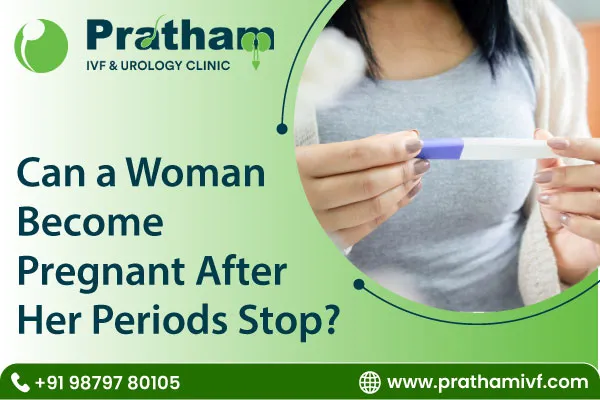
The connection between a woman's menstrual cycle and her fertility is strong, but not always simple. Typically, the absence of periods—especially after menopause—means that ovulation has stopped, making natural pregnancy unlikely. However, it's important to understand that missing periods don't always mean fertility is gone. In cases of irregular periods, hormonal imbalances, or certain medical conditions, ovulation can still occur unexpectedly, creating a chance for pregnancy. Additionally, with the help of assisted reproductive technologies like IVF, pregnancy is still possible even after natural cycles stop, especially with donor eggs or hormone treatments.
Understanding your cycle, monitoring ovulation, and seeking medical advice are essential when planning for pregnancy at any stage. Whether you're dealing with irregular periods, menopause, or fertility challenges, expert care can help guide you toward the right solution. Always consult a fertility specialist to explore your options based on your reproductive health.
Menstrual Cycle
The menstrual cycle is a natural process experienced by women of reproductive age. It typically lasts between 24 to 35 days, though this can vary greatly between individuals. The cycle is controlled by hormones such as estrogen and progesterone, regulating the preparation of the uterus for pregnancy.
The cycle consists of four main phases:
- Menstrual Phase: The lining of the uterus sheds, resulting in bleeding
- Follicular Phase: Hormones stimulate the development of eggs in the ovaries
- Ovulation Phase: A mature egg is released from the ovary
- Luteal Phase: The uterine lining thickens, preparing for potential pregnancy
Common Misconceptions About Pregnancy and Periods
One common misconception is that a woman cannot become pregnant if she does not have regular periods. In reality, ovulation—the release of an egg—is what determines fertility, not menstruation itself. Even without regular periods, a woman may ovulate occasionally, potentially resulting in pregnancy.
Explanation of Ovulation and Fertile Window
Ovulation is the most critical phase for pregnancy. It typically occurs around the midpoint of the menstrual cycle. During ovulation, a mature egg is released from the ovary and travels down the fallopian tube, available to be fertilized by sperm. The fertile window is a brief period—usually around six days, including the day of ovulation—during which conception is possible.
Factors Affecting Ovulation and Period Timing
Several factors can disrupt ovulation and menstrual timing, including:
- Stress and emotional disturbances
- Weight changes, obesity, or extreme weight loss
- Hormonal abnormalities such as thyroid problems and PCOS
- Excessive physical exercise
- Certain medications or medical conditions
Recognizing these characteristics allows women to better control their fertility and reproductive health.
Menopause and Fertility
Definition and Symptoms of Menopause: Menopause is the natural end of the reproductive years for a woman, which normally happens between the ages of 45 and 55. It is described as a period of 12 months without menstruation. Common symptoms include:
- Hot flashes and night sweats
- Mood swings and irritability
- Difficulty sleeping
- Decreased libido
- Vaginal dryness
Impact of Menopause on Fertility
Menopause signals the end of ovulation. Without egg release, natural pregnancy becomes nearly impossible. Hormone production diminishes, significantly impacting fertility.
Possibility of Pregnancy After Menopause
While natural pregnancy after menopause is extremely rare, medical interventions such as IVF using donor eggs can enable women to conceive even post-menopause. Such fertility treatments make pregnancy achievable despite natural barriers.
Irregular Periods and Pregnancy
- Causes of Irregular Periods: Irregular periods are caused by factors like hormonal imbalances, PCOS, thyroid disorders, stress, poor diet, and certain medications. Recognizing the underlying cause is essential for fertility management.
- How Irregular Periods Affect Fertility: Irregular periods complicate tracking ovulation, making conception challenging. Irregular cycles can indicate inconsistent ovulation, reducing chances of conception naturally.
Strategies for Tracking Ovulation with Irregular Periods
Women with irregular periods can track ovulation by:
- Using ovulation predictor kits
- Monitoring basal body temperature daily
- Checking cervical mucus consistency
- Regular visits to fertility specialists for ultrasounds and hormone monitoring
These strategies help improve the chances of conceiving despite irregular cycles.
Pregnancy Signs and Symptoms
Early Signs of Pregnancy: Recognizing early pregnancy signs can help women identify conception. Typical early pregnancy symptoms include:
- Missed periods
- Nausea or morning sickness
- Fatigue and exhaustion
- Breast tenderness and sensitivity
- Increased frequency of urination
- Mild cramping and spotting
Differentiating Pregnancy Symptoms from Period Symptoms
Pregnancy and menstrual symptoms can overlap, such as cramping and mood swings. However, pregnancy symptoms typically persist and intensify, accompanied by signs like missed periods, nausea, and heightened breast sensitivity. Pregnancy tests can confirm pregnancy accurately.
Contraception and Fertility
Contraceptive methods differ significantly in effectiveness:
- Hormonal contraceptives (birth control pills, patches): over 99% effective when used correctly
- Condoms: approximately 85–98% effective
- Intrauterine devices (IUDs): over 99% effective
- Natural family planning: about 76–88% effective
Choosing a contraceptive should involve understanding effectiveness, convenience, and individual health needs.
Risks of Pregnancy if Contraception Fails
Contraceptive failure can occur due to incorrect usage or product failure. In such cases, unintended pregnancy becomes possible. Consulting healthcare professionals about contraceptive reliability and emergency contraception helps mitigate such risks.
Why Choose Pratham IVF Center?
If you are struggling with fertility due to age-related concerns, irregular periods, menopause, or contraception failures, Pratham IVF Center in Ahmedabad is here to help. As a trusted IVF center in Ahmedabad, we provide personalized fertility treatments designed to meet your unique health needs. Our experienced specialists utilize advanced reproductive technologies such as IVF, IUI, and donor egg treatments to improve your chances of conceiving.
At Pratham IVF Center, we combine compassionate care with medical expertise to support you through every step of your fertility journey. We understand that age and menstrual irregularities can impact fertility, but these factors are no longer barriers to motherhood thanks to modern treatments.
Recognized as a leading IVF hospital in Ahmedabad, we focus on delivering successful outcomes with a patient-centered approach. Whether you are considering IVF treatment in Ahmedabad for the first time or seeking expert guidance after previous challenges, our skilled team is dedicated to helping you achieve your dream of parenthood. Choose Pratham IVF Center for trusted care, innovative treatments, and unwavering support on your path to becoming a parent.
Conclusion
The possibility of pregnancy after periods have stopped is often misunderstood. Menstrual cycle irregularities, ovulation patterns, and menopause each impact fertility differently. Although natural pregnancy becomes unlikely after menopause, medical interventions like IVF can offer hope. Women must maintain regular health checks, understand their menstrual cycles, track ovulation effectively, and seek professional guidance promptly if pregnancy concerns arise. For expert guidance, compassionate care, and advanced fertility treatments, book an appointment today at Pratham IVF Center, the famous IVF center in Ahmedabad. We provide personalized solutions that make parenthood possible, regardless of age or menstrual history.
Schedule your consultation at Pratham IVF Center, Ahmedabad. Contact: +91 98797 80105, Email: prathamivf@gmail.com
 Ahmedabad Top Rated IVF Center
Ahmedabad Top Rated IVF Center




